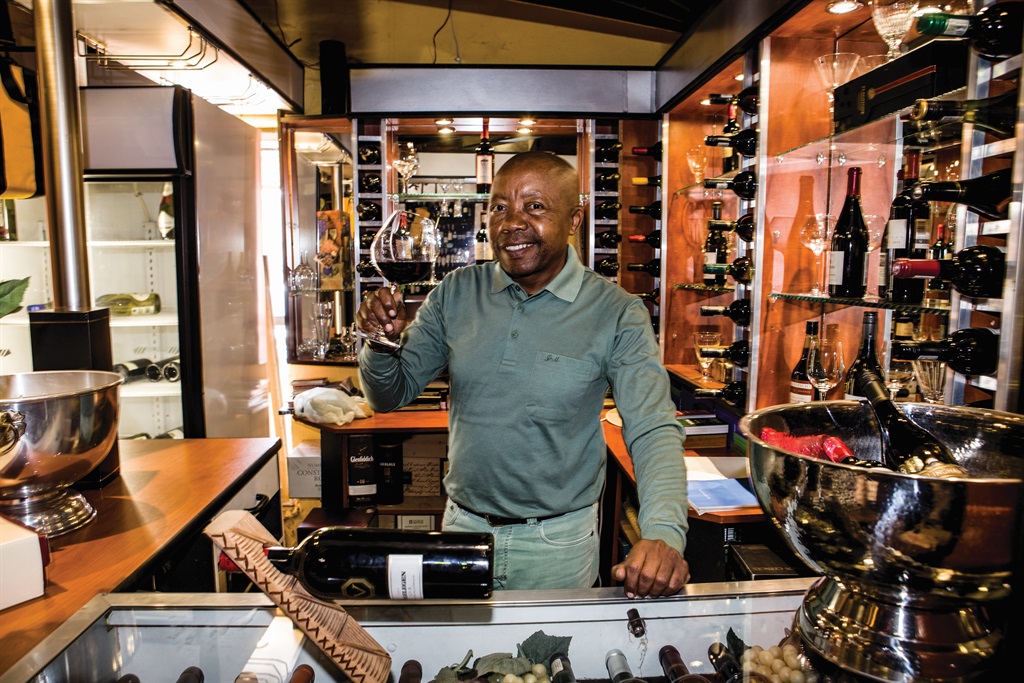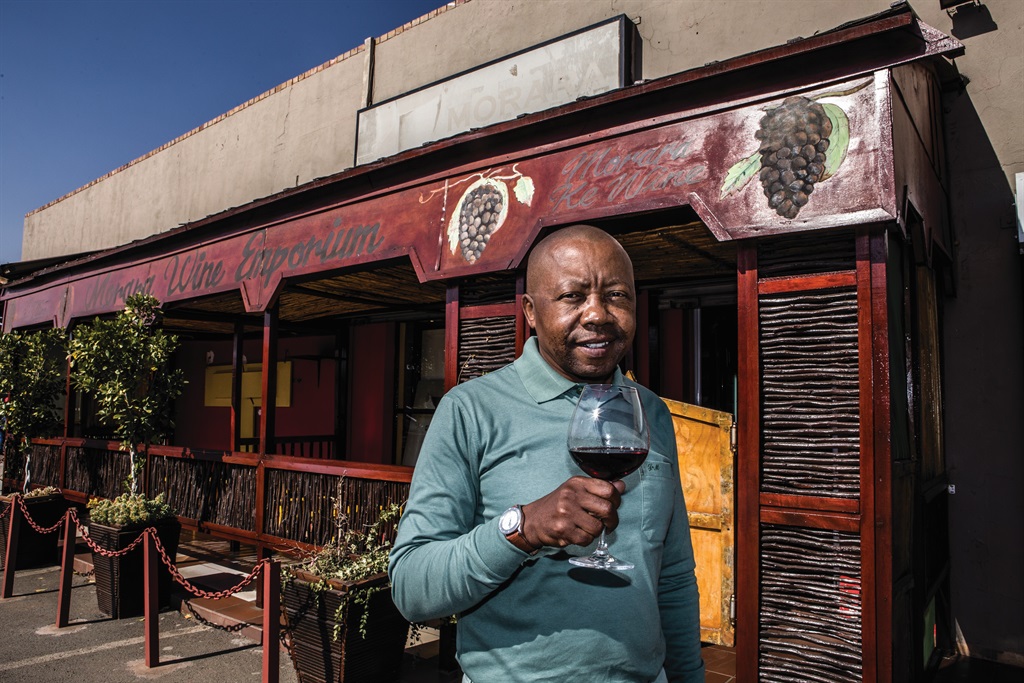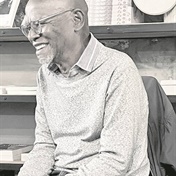
For Mnikelo Mangciphu, it’s all about changing the mindset of winemaking and the consumption of wine within the black community, something that he has refused to give up on. 12 years later and the Soweto Wine Festival has grown in leaps and bounds. In this extract from Colour of Wine: Tasting Change, he talks about the challenges that he has faced.
I don’t measure my achievement by how many bottles of wine I’ve sold, but by how many people understand wine better and come back for more.
Morara Wine, which opened in 2005, was Soweto’s first boutique wine and spirits shop. We stock over a hundred wine labels, ranging from easy drinking to good value and expensive brands. The walls are stacked from floor to ceiling with an array of South African wines: John Carlou, Nederburg, Kanonkop and Fairview.
The shop is located in Mofolo, once the home of Soweto’s more affluent population. When you told people you lived in Mofolo, they looked up to you. In 1978 we boasted Soweto’s first proper cinema – Eyethu. I often walked there to watch a movie. I saw The Good, The Bad and the Ugly, The Ten Commandments and my favourite, Jaws.
Things changed in the mid-1980s when migrants moved into the hostels and shack dwellers took over parts of Mofolo. But it’s still a vibrant suburb, boasting restaurants and pubs and Mofolo Park where regular jazz events take place. Across the street from my shop is a local car-tyre place, a carwash and a woman selling fruit and vegetables by the side of the road.
And there’s something else, something unusual about my shop. There are no steel bars here. Most stores selling liquor in Soweto sell from behind metal bars. But I feel safe because this is my community. The shop is down the road from the house where I grew up. Everyone knows me.
Wine is something new and can be intimidating, but I’m introducing it around people I know. That makes a big difference. If you know a place it’s easier to influence change.
My father died when I was four years old. My mother supported all of us – my three sisters and me – on her nurse’s salary, and because she had to work night shifts we were sometimes sent to live with our grandmother in Emdeni.
At the age of 16, I got caught up in the June 1976 student uprising. On 15 June, we heard rumours that we were marching to Pretoria the next day to protest the introduction of Afrikaans into schools. I arrived at school on 16 June and students were chanting ‘Khulula uMandela’ – release Mandela so he can come speak on our behalf. I joined in and then from nowhere three nyalas shot teargas at us. I was next to my friend Barry. Suddenly a stray bullet hit Barry behind the ear and I watched my friend die in front of me.
My friends and I had to walk 20 kilometres home because there was no transport. Burned cars and trucks littered the streets. Just before we reached Mofolo, one of the guys suggested that we go loot the local bottle store, which was associated with the hated West Rand Administration Board – a symbol of apartheid repression. So we ran to the Dube bottle store and took two cases of Viceroy brandy, which we buried under a tree in our yard. Then we returned to the street to drink some of our spoils. That day was the first time I had alcohol. I got completely drunk and when darkness fell, I was trapped. Was it worse to stay on the street and risk being picked up by the security police, or to go home and face my mother?
My mother found me and dragged me home, and my sister told her about the hidden alcohol in the yard. She forced me to dig up every bottle and then poured it all down the drain. Like many young township boys, I didn’t go back to school. I loitered for four years. I wanted to join my friends and neighbours who were going into exile but I didn’t want to leave my mother alone. I was the man of the house.
I couldn’t find work and it was the days of boycotts. We would wait at the entrance to the township and stop people going to work or buying goods in the city.
My mother was scared for me and sent me away to relatives in Nelspruit. There, I bunked school for a year. I never liked school and just went to please my mom. And I missed the township. My friends were fighting the regime and I was stuck in Nelspruit!
Finally, at 22, I came back to Soweto to finish matric. After that a friend who’d left the country helped me get a United Nations scholarship to study in Lesotho, where I did a four-year diploma in accounting. I returned home and spent the next eight years working in the meat business. I got married and moved to Pretoria.
It was during this time that I first became acquainted with wine. More than the taste, I fell in love with the people who were drinking it. They were chilled and calm. I wanted to be like them. I registered for a one-year part-time course on South African wines with the Cape Wine Academy.
One day I was having a drink with a friend who had a mug that said ‘Soweto Beer Festival’ and it came to me – we should have a Soweto Wine Festival. So, through a friend, I approached Marilyn Cooper, then the CEO of the Cape Wine Academy. I knew I needed support because if I tried to start a project like this, no wine farm would buy my story. They had this perception that wine isn’t for black people. But she loved the idea.
So the Soweto Wine Festival was born, a partnership between Marilyn Cooper and myself. It’s a platform for people from Soweto to come and experience wines, to grow black consumers. But the first festival, in 2004 at the Ubuntu Kraal in Orlando West, wasn’t a success. We had about 1 500 visitors over three days. We hadn’t really explained what the event was about and people came because it was a cheap way to get drunk. They didn’t see it as an opportunity to learn about wine and interact with winemakers from different wineries. This upset many exhibitors who weren’t keen to return, but I wasn’t giving up.
I persuaded wine farms and owners that we had to support each other. Changing mindsets takes time. If we made it work, it would address all our bottom lines. We wanted to get it right, to promote wine and responsible drinking too. And we did get it right – 12 years later the Soweto Wine Festival is now an annual event.
Morara Wine, which was inspired by the Soweto Wine Festival, gives people a space to come and ask questions about wine and learn to enjoy it. I knew when I started out that there wasn’t a ready-made market for my new business. Wine isn’t a drink of choice for black people. I knew when I ventured into this that there was a whole lot of work to be done to cultivate the market. Traditionally we’re spirits, cider and beer drinkers. Many people have negative perceptions about wine – that it’s for whites, it’s elitist.
About four years ago some guy came to the shop and he wanted some advice on what kind of wine to buy. I asked him what he enjoyed – do you have a sweet palate? Do you want something more dry? He said he was buying it for his girlfriend, so to just give him something sweet. Later I discovered that he was buying it for himself. He was embarrassed to tell me that, because in our community if you’re a black man seen to be drinking wine, you’re labelled a sissy.
Customers who used to say, ‘Give me red wine,’ now come into Morara Wine and Spirits Emporium and ask for a Pinotage or a Shiraz. For me, this represents progress. I feel great pride when people who came through the door five years ago asking for a box of sweet wine now say, ‘Mnikelo, I think I want to try a new blend. What do you recommend?’ This is what changing the mindset of a community is all about.
- The Colour of Wine: Tasting Change by Harriet Perlman, John Platter et al., photographs by Mark Lewis, R450, Orders: Booksite Afrika, email: orders@booksite-afrika.co.za




 Publications
Publications
 Partners
Partners









